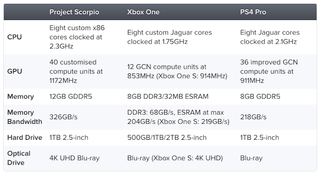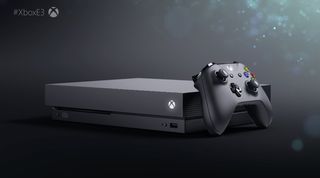Here's how Microsoft's $500 Xbox One X compares to a PC
A 4K gaming console vs. a gaming PC? Here's how the systems match up.
Several weeks ago Microsoft lifted the covers slightly off its new next-gen console, codenamed Project Scorpio. Today, the software giant took the full wraps off what is now called the Xbox One X, which launches this year for $500. Here's the lowdown on how powerful Scorpio is, and how it compares to a gaming PC.
In its livestream today, Microsoft went over some of the advanced capabilities of the Xbox One X, including Dolby Atmos audio support and HDR video. The Xbox One X will supersample existing Xbox One games, which is useful if you don't have a 4K TV. It will run them at 4K resolution, downsampling to a 1080p resolution for a sharper picture.
Microsoft also announced that the Xbox One X is its smallest Xbox console ever, which makes for a pretty damn compact box if it's smaller than the Xbox One S.
Here are the specs for the Xbox One X:

Microsoft has built this console for 4K gaming, something we've found demanding on PC without top-end hardware. So how does the Xbox One X compare to a gaming PC? Here's our breakdown.
Gaming PC vs. Xbox One X
All of the money in the Xbox One X is focused on graphics, though its CPU has gotten a boost over the standard Xbox One.
Compared to a desktop CPU, the Xbox One X's CPU will be a substantial bottleneck. The eight Jaguar CPU cores will offer one-half to one-third the performance of AMD's new Ryzen CPUs. As we wrote when the Scorpio specs were first revealed, all eight cores working together will maybe roughly equal the performance of an Intel i3 CPU.
PC Gamer Newsletter
Sign up to get the best content of the week, and great gaming deals, as picked by the editors.
Scorpio's GPU has 40 customized compute units clocked at 1172MHz; and Scorpio boasts a generous 12GB of GDDR5 RAM with a memory bandwidth of 326GB/s—substantially higher than the 8GB and 256GB/s of AMD's RX 580 PC graphics card. To get that kind of memory on a PC graphics card, you'll have to step up to a GeForce Titan Xp. Keep in mind, however, that on the Xbox One X the memory is split between GPU and system, with Microsoft recently saying developers will be able to use 9GB of the GDDR5 RAM.
But don't mistake the GPU specs in Scorpio for equivalent PC power. There is no chance in hell the Scorpio's graphics power is anywhere near that of a Titan Xp just because it has the same amount of memory. If you were to buy something equivalent, expect an AMD RX 580 or GeForce GTX 1060, but those desktop graphics cards have less video memory.
Scorpio's generous RAM capacity and high bandwidth come into play because Scorpio is poised to do 4K gaming—although we're not sure if this will apply across all titles. You're essentially looking at up to 15-percent better performance from Scorpio than a plain RX 480. We figure performance will be close to the RX 580, but with more bandwidth.
This bandwidth allows the Xbox One X to do higher resolution 4K gaming, as long as the developers don't go overboard on things that rely on computational performance.
With desktop hardware, an RX 580 wouldn't be enough to do 4K gaming. But remember that as a console, both software and hardware are tightly integrated and optimized. The operating system is much more optimized than it is on a standard PC. Having a fixed spec also allows game developers to hone in their code, since there's no need to support a wide variety of configurations. Tight integration has always been the console's strength, in exchange for upgradeability.

In terms of desktops, at $500 the Xbox One X competes with our cheap gaming PC build guide. And for the price, the specs are pretty similar. Our rig has a 3GB GTX 1060, which is about on par with the power level described above (though with significantly less GDDR5 RAM, as mentioned). Our rig also doesn't account for the price of Windows, but the trade-off there is you get a fully-functioning PC, as opposed to the locked ecosystem of a console. And, of course, the ability to upgrade down the line.
The Xbox One X is an impressively powerful small form factor system, with graphics power that rivals a decent PC graphics card and a CPU that falls short of what we'd expect from a gaming PC. It would be hard to build a gaming PC this compact at the same price, but as always, a gaming PC will be a more versatile system.
Most Popular




